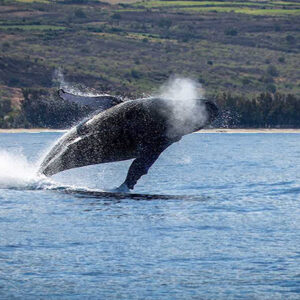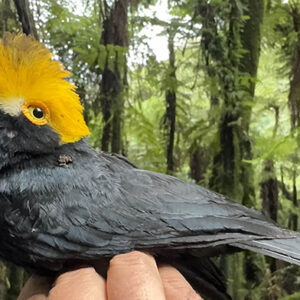
In an extraordinary occurrence, the New England Aquarium’s aerial survey team made a remarkable discovery off the coast of New England last week. They spotted a gray whale, a species that has been extinct in the Atlantic for over two centuries.
The event unfolded when the Aquarium’s scientists were conducting a flight approximately 30 miles south of Nantucket on March 1st. During their observation, they encountered a whale exhibiting unusual behavior. The creature repeatedly submerged and resurfaced, displaying what appeared to be feeding activity.
The survey plane proceeded to circle the area for a duration of 45 minutes, affording the observers ample opportunity to document the sighting through additional photographs. Subsequently, upon reviewing the captured images, the team’s suspicions were confirmed: the whale in question was indeed a gray whale.

This remarkable event not only highlights the importance of ongoing scientific research and monitoring efforts but also underscores the potential for unexpected discoveries even in regions where certain species were believed to have vanished long ago.
“I didn’t want to say out loud what it was, because it seemed crazy,” said Orla O’Brien. She’s a associate research scientist in the Anderson Cabot Center for Ocean Life at the New England Aquarium.
During the whale’s descent, O’Brien presented the photos to Research Technician Kate Laemmle, who was accompanying them in the aircraft.
“My brain was trying to process what I was seeing, because this animal was something that should not really exist in these waters,” Laemmle shared in a press release. “We were laughing because of how wild and exciting this was—to see an animal that disappeared from the Atlantic hundreds of years ago!”
Gray whales, a distinctive species known for their absence of a dorsal fin, mottled grey and white skin, and unique dorsal hump complemented by pronounced ridges, are a common sight in the North Pacific Ocean. However, their historical presence in the Atlantic Ocean waned by the 18th century. Yet, recent years have witnessed an intriguing resurgence, with five confirmed sightings of gray whales in Atlantic and Mediterranean waters within the last 15 years, including a notable encounter off the coast of Florida in December 2023.
Notably, aquarium scientists have hypothesized that the gray whale spotted off New England this month is the very same individual observed off the Florida coast late last year. Such conjecture adds a layer of continuity to the otherwise sporadic appearances of this species in Atlantic waters.
Delving into historical records, The Washington Post unearthed writings from a colonial official dating back to 1729, detailing an encounter with a “scrag whale” off the Massachusetts coast. This account serves as a poignant reminder of the last documented sighting of a gray whale in the region centuries ago, contrasting sharply with their relative abundance along the California coastline.
Scientists investigating these anomalous sightings have turned their attention to climate change as a potential explanatory factor. The phenomenon of the Northwest Passage, traditionally impassable due to thick ice, has undergone a notable transformation in recent years. With rising global temperatures leading to increased ice melt, the passage has become more navigable during the summer months.
This newfound accessibility potentially facilitates the movement of gray whales between the Pacific and Atlantic Oceans, offering a plausible explanation for their unexpected appearances in Atlantic and Mediterranean waters. Experts suggest that the historical limitation imposed by extensive sea ice may have hindered the species’ range, effectively confining them to Pacific waters. However, the changing dynamics of the Northwest Passage now afford gray whales the opportunity to traverse between oceans during the warmer seasons, a phenomenon inconceivable in previous centuries.
“This sighting highlights how important each survey is. While we expect to see humpback, right, and fin whales, the ocean is a dynamic ecosystem, and you never know what you’ll find,” O’Brien said. “These sightings of gray whales in the Atlantic serve as a reminder of how quickly marine species respond to climate change, given the chance.”
Leigh Torres, a marine biologist from Oregon State University, suggested to The Post that the most probable scenario was that the grey whale observed during the aerial survey was a young juvenile that had “taken a wrong turn.”
“I consider gray whales to be ‘risk takers,’ meaning they show up and feed in places that we often don’t expect or consider ‘normal,’” she stated. Such behavior sometimes means a provision for “good adaptation to changing conditions, like finding a new feeding area or food type,” she then added.
What are your thoughts? Please comment below and share this news!
True Activist / Report a typo


